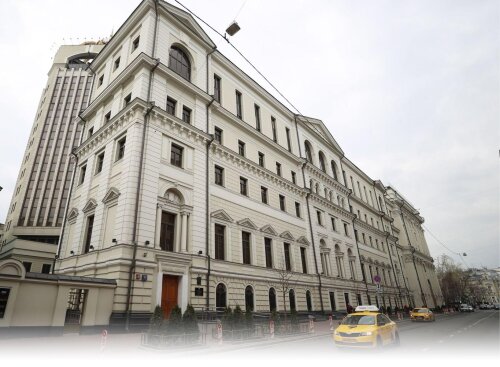Best Employment & Labor Lawyers in Russia
Share your needs with us, get contacted by law firms.
Free. Takes 2 min.
Or refine your search by selecting a city:
List of the best lawyers in Russia

About Employment & Labor Law in Russia
Employment and labor law in Russia is designed to protect workers' rights while balancing the interests of employers. The framework encompasses a wide range of issues, including employment contracts, working conditions, wages, occupational health and safety, and the resolution of employment disputes. Central to this legal framework is the Russian Labor Code, which governs most employment relationships in the country, providing rules and regulations to ensure fair treatment of employees and the effective functioning of the labor market.
Why You May Need a Lawyer
There are many situations in which individuals may require legal assistance in employment and labor matters in Russia. Common scenarios include:
- Understanding and negotiating employment contracts or separation agreements.
- Dealing with wrongful termination or unfair dismissal claims.
- Addressing issues related to workplace discrimination or harassment.
- Resolving wage disputes or claims for unpaid salaries and benefits.
- Navigating changes in employment status or roles, such as during reorganizations.
- Seeking legal recourse for occupational accidents or work-related illnesses.
Legal advice can also be vital for employers to ensure compliance with labor laws, avoid disputes, and protect their interests.
Local Laws Overview
The Russian labor relations system is primarily governed by the Labor Code, which establishes fundamental employee rights and employer obligations. Key aspects of the law include:
- Employment Contracts: Must be in writing and include essential terms such as job description, remuneration, working conditions, and rights and responsibilities of both parties.
- Working Hours and Leave: Regular working hours should not exceed 40 hours per week. Employees are entitled to annual paid leave of at least 28 calendar days.
- Wages and Benefits: Employers must pay employees at least semimonthly, and not below the legally established minimum wage. Failure to pay salaries can result in penalties for employers.
- Termination and Redundancies: Specific grounds and procedures for termination are established, and employers are required to provide notice and severance in certain cases.
- Health and Safety: Employers must provide safe working conditions and comply with occupational health and safety regulations.
Frequently Asked Questions
What is the legal minimum wage in Russia?
The minimum wage in Russia is set by federal law and is subject to frequent revisions. It is important to check the current rate as it varies by region.
Can an employer terminate an employee without cause?
No, Russian law requires an employer to have a valid reason to terminate an employee's contract. There are specific procedures and grounds for termination outlined in the Labor Code.
What should I do if I believe I have been unfairly dismissed?
If you believe you have been unfairly dismissed, you should seek legal advice to explore your options for challenging the dismissal and potentially seeking compensation or reinstatement.
Are employees entitled to maternity leave?
Yes, female employees are entitled to maternity leave, which includes 70 days before and 70 days after childbirth, with extensions in certain cases of multiple births or complications.
What are my rights regarding workplace discrimination?
Discrimination based on gender, race, nationality, language, origin, property status, place of residence, religion, beliefs, membership in public associations, or other circumstances is prohibited in Russia. Victims of discrimination can seek legal recourse.
How is overtime compensated?
Overtime work must be compensated at a higher rate than regular working hours or compensated by additional time off. The specific conditions and limits for overtime are regulated by the Labor Code.
Is there legal protection against sexual harassment in the workplace?
Yes, Russian law provides protection against sexual harassment, and victims have the right to file complaints and seek legal action against perpetrators.
What are the legal obligations of an employer in terms of workplace safety?
Employers are required to ensure safe working conditions by complying with statutory obligations related to occupational health and safety, conducting regular safety training, and assessing workplace hazards.
Can I negotiate my employment terms during my contract?
Yes, employment terms can be negotiated, but any changes must be documented in writing and mutually agreed upon by both employer and employee.
What support is available for workplace injuries?
Employees who suffer workplace injuries are entitled to medical care, salary compensation during their recovery, and potentially additional benefits, depending on the severity of the injury and circumstances.
Additional Resources
For further assistance and information, individuals can contact the following organizations:
- Federal Service for Labor and Employment (Rostrud): The main body overseeing labor issues and disputes in Russia.
- The Chamber of Commerce and Industry of the Russian Federation: Offers resources for employers and employees, including legal advice on employment matters.
- Trade Unions: Regional trade unions provide support and assistance to their members on labor issues.
- Legal aid clinics or firms specializing in labor law: They offer consultations and can represent individuals or companies in employment disputes.
Next Steps
If you need legal assistance in employment and labor matters in Russia, consider the following steps:
- Identify the specific legal issue you are facing and gather all relevant documentation.
- Consult with a specialized lawyer in employment and labor law who understands the intricacies of the Russian legal system.
- Explore free or low-cost legal aid services if cost is a concern.
- If an agreement cannot be reached through consultation, be prepared to take your case to court or a labor dispute commission for resolution.
Lawzana helps you find the best lawyers and law firms in Russia through a curated and pre-screened list of qualified legal professionals. Our platform offers rankings and detailed profiles of attorneys and law firms, allowing you to compare based on practice areas, including Employment & Labor, experience, and client feedback.
Each profile includes a description of the firm's areas of practice, client reviews, team members and partners, year of establishment, spoken languages, office locations, contact information, social media presence, and any published articles or resources. Most firms on our platform speak English and are experienced in both local and international legal matters.
Get a quote from top-rated law firms in Russia — quickly, securely, and without unnecessary hassle.
Disclaimer:
The information provided on this page is for general informational purposes only and does not constitute legal advice. While we strive to ensure the accuracy and relevance of the content, legal information may change over time, and interpretations of the law can vary. You should always consult with a qualified legal professional for advice specific to your situation.
We disclaim all liability for actions taken or not taken based on the content of this page. If you believe any information is incorrect or outdated, please contact us, and we will review and update it where appropriate.
Browse employment & labor law firms by service in Russia
Russia Attorneys in related practice areas.
Browse employment & labor law firms by city in Russia
Refine your search by selecting a city.















